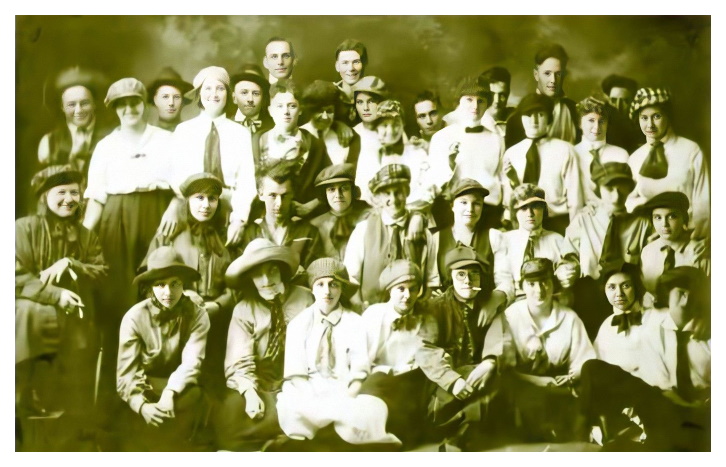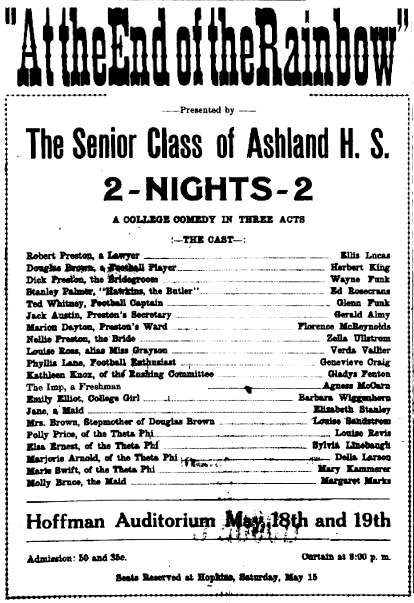
Ashland 1920 High School Graduation

Elizabeth Stanley graduated from Ashland High School in 1920. She was in the College Preparatory program and played a role in the Senior Class Play.
According to the Ashland Gazette article about the graduation, this was the largest class graduated from Ashland high school, consisting of 25 girls and 8 boys. The girls were dressed in "dainty, crisp dresses of ruffled organdy" and the stage was decorated with purple and gold. The class gift was a statue of Caesar's wife. It was made of pure Parian marble, and stood about 3 feet high. They also restored the bell from the old school building, which was destroyed in a fire.


1920 Senior Class

This picture was found in Elizabeth Stanley Scott's photo album. The following list of students is on the back of the picture. Elizabeth Stanley is second from the left in the bottom row.
Gladys Endicott, Elizabeth Stanley, Abbie Keiser, Delia Larson, Florence Parrish, Anna Coleman, Mignon Almy, Louise Sandstrom, Mildred Folsom, Agnes McCarn, John Peterson, Louise Revis, Barbara Wiggenhorn, Vera Bushnell, Mary Kammerer, Doris Deane, Irene Cook, Rosie Owens, Genevieve Craig, Gladys Fenton, Wayne Funk, Verda Vallier, Mildred Bushnell, Lola Sandy, Sylvia Linebaugh, Florence Williams [McReynolds?], Margaret Marks, Zella Ullstrom, Gerald Almy, Ellis Lucas, Mr. Bishop, Rudolph Ziegenbein, Herb King, Glenn Funk, Edwin Rosecrans, Dale Miller


Reprinted from Ashland Gazette, May 21, 1920
SENIOR CLASS PLAY A BIG SUCCESS
Given Two Nights to Packed Houses - Performance to Be Given Again Saturday Evening - Players Do Well.

The class play, "At the End of the Rainbow," a three-act college comedy, was given Tuesday and Wednesday nights at the Auditorium, to full houses. On account of the rapid sale of seats, and the disappointment of many who were unable to secure seats for either performance, the play will be given again on Saturday evening. It was thought that the heavy rain Wednesday afternoon would make it impossible for many to attend, but the house was full, showing that Ashland people and those from the surrounding community are strong supporters of affairs put on by the school.
The play was an entertaining story of college life, one of those plays well adapted to high school production, and full of enjoyment to the players as well as the audience. It is difficult to tell of the good work of the players, in a way proportionate to their success, each player doing exceptionally well in his part.
Florence McReynolds, as Marion Dayton, the leading lady, quite won her audience by being her own sweet self, which has made her one of the most popular girls in the school, as well as the winner of first honors for scholarship, although in the second act she had opportunity for some emotional acting which she "put over the footlights" effectively and dramatically. Genevieve Craig, as Phyllis Lane, a football enthusiast, carried the second lead capably and interpreted well the part of the college girl ready to do all in her power to assure the success of the college team. Verda Vallier, as Louise Ross alias Miss Grayson, had perhaps the strongest character part in the play, and was such a success in her acting that she made herself thoroughly detested as the scheming "villianess." Margaret Marks, as Molly Bruce, the young lady who had to be maid in the Preston home before the college girls would pledge her to Theta Phi, furnished much of the evening's fun in her conversations with Hawkings, the Butler. Agness McCarn, as the Freshman Imp, also did some clever acting in her part, proving to be a real help in disposing of the designing Miss Grayson. Zella Ullstrom, as Nellie Preston, the bride, had one of the leading parts, and interpreted well the part of the newly married young lady who was inclined to be a wee bit jealous. Louise Sandstorm, as the mother of Miss Grayson, had a only a small part in the play, but in the short time she was on stage, she clearly depicted the character of a relentless money seeker. Louise Revis, Barbara Wiggenhorn, Sylvia Linebaugh, Delia Larson, Gladys Fenton, and Mary Kammerer, as the college girls, and members of Theta Phi, instilled into the play the dashing enthusiasm and excitement of a winning football team, and the mysteries of sorority pledging. Elizabeth Stanley, as the maid who read too many dime novels, was also very good in her part, winning for herself many laughs.
Ellis Lucas, as Robert Preston, a lawyer, was well chosen for the part, his work in debate and oratory showing up well in his character. His makeup was good, and he did some especially effective acting in the last act. Douglas Brown, a football player, was represented by Herbert King, and he showed himself not only a star player, but a successful lover as well. Wayne Funk, as Dick Preston, the bridegroom, won many laughs for himself, especially in his mad desire for having a butler. Ed Rosecrans, as Stanley Palmer, a fraternity pledge, who had to serve in the Preston home as Hawkins, the Butler, was one of the star actors of the evening, and everybody voted him to be the masculine beauty of the cast, especially in his butler outfit. Glenn Funk, as captain of the football team, did some good work in the last act, when he had been hurt and had to be taken from the game. Gerald Almy, as Jack Austin, Preston's secretary, came out with some good acting in the second and last acts, helping along the excitement coincident with the stealing of the packet.
A feature that distinctly added to the success of the evening's entertainment was the pretty dancing of little Miss Florence Dole, an adopted daughter of Mr. and Mrs. M. E. Ballou. Her dance was given after the second act, and was accorded with such hearty applause that she gave an encore number both nights. The second evening of the play, Ted Thompson and John Peterson gave a little comedy act, which was well received.
The young people had their lines learned thoroughly, and their production showed the results of long and diligent training by their coaches. Superintendent Cary and Principal Bishop. The class of 1920 may well be proud of the play presented, and of the reception accorded it by the people of Ashland. Just as in the play, the pot of gold at the end of the rainbow was won, so the seniors themselves won their hearts' desire in having their play a success financially and in winning public approbation.



